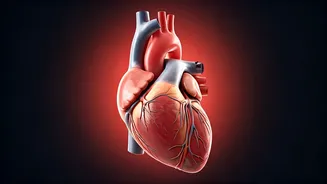Silent Heart Attack Alarms
Silent heart attacks, unlike their more dramatic counterparts, may present with less obvious signs, making them harder to detect. Individuals could experience
bloating, burping, or mild chest discomfort, which are often dismissed as digestive issues. However, these symptoms can indicate reduced blood flow to the heart, necessitating a need to seek prompt medical attention. Recognizing these subtle signals is vital. If someone experiences persistent or unusual bloating, frequent burping, or chest discomfort, especially when coupled with other risk factors, it is crucial to consult a healthcare professional. These seemingly insignificant symptoms could be a critical alert, signalling a need for immediate evaluation and intervention to prevent further complications. This proactive approach underscores the importance of being attuned to one's body and seeking medical advice without delay.
Subtle Physical Indicators
The body might reveal underlying heart risks through other, sometimes unexpected, signs. For instance, the ability to perform push-ups could offer a glimpse into cardiovascular health. Completing 40 push-ups might indicate a reduced risk of heart attacks, as supported by insights from medical professionals. Furthermore, indicators can include visible signals that manifest on the hands. Skin changes, such as unusual discolorations or the appearance of certain textures, could provide critical clues. These observations underscore the importance of regular self-checks and seeking professional medical guidance, especially when combined with existing risk factors. These factors provide an opportunity to proactively address potential problems and to initiate necessary lifestyle changes or medical treatments, safeguarding one's heart health.
Everyday Habits Matters
Lifestyle choices significantly affect heart health, and incorporating some habits can promote a healthier cardiovascular system. The article suggests focusing on habits that support overall well-being. This can involve making dietary adjustments, such as including heart-healthy foods in the daily diet, and also staying physically active, like incorporating regular exercise. Regular physical activity, even moderate exercises like brisk walking, can significantly improve cardiovascular health. Reducing stress is also important, achieved through various relaxation techniques, which can protect the heart from strain. Adopting these habits is a way to proactively work towards a healthier heart and improve overall well-being. Prioritizing these habits helps build a solid foundation of preventative care and offers a tangible effect on long-term health.
Actionable Steps Forward
Taking decisive action based on potential signs and symptoms is important for maintaining heart health. When experiencing any of the discussed symptoms, immediate medical consultation is essential. Informing your healthcare provider about observed changes, along with any existing risk factors, aids in accurate diagnosis. Following medical advice, which might encompass lifestyle adjustments, medications, or further examinations, contributes to improving heart health. Staying aware of your body's signals and being proactive in seeking medical care are crucial. This proactive approach supports early detection and management of potential issues, potentially averting serious health problems. Emphasizing regular check-ups, adhering to medical advice, and making informed lifestyle decisions are the key steps to safeguard one's heart health.




















